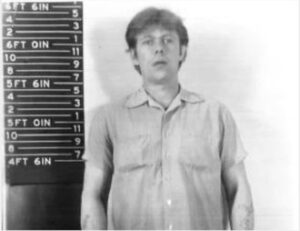
Harry Edward Greenwell
By Debbie Burke
Between 1987 and 1990, three women were sexually assaulted and murdered and one more was raped and left for dead in what were dubbed the “Days Inn/I-65 Murders” in Indiana and Kentucky.
The victims were all hotel clerks working the night shift. Vicki Lucille Heath, 41, was sexually assaulted and murdered on February 21, 1987 and her body found behind a trash bin. Two more victims, Margaret Mary “Peggy” Gill, 24, and Jeanne Gilbert, 34, were both sexually assaulted and killed four hours apart on March 3, 1989 at two different Days Inns in Indiana.
On January 2, 1990, a 21-year-old victim was sexually assaulted and stabbed but survived. She gave information to investigators that led to a composite drawing of the attacker.

Composite of I-65 Killer
Ballistic evidence and DNA connected the cases and indicated the same person committed all four attacks.
But who was he?
For more than 30 years, the cases went unsolved despite physical evidence…until the advent of the relatively new field of Investigative Genealogy.
According to the FBI:
Investigative Genealogy and combines the use of DNA analysis with traditional genealogy research and historical records to generate investigative leads for unsolved violent crimes.
This technique involves uploading a crime scene DNA profile to one or more genetic genealogy databases in an attempt to identify a criminal offender’s genetic relatives and locate the offender within their family tree. Utilizing this process, a match was made to [Harry Edward] Greenwell with a close family member. Through this match, it was determined that the probability of Greenwell being the person responsible for the attacks was more than 99 percent.
Harry Edward Greenwell, born in 1944, had a long, violent criminal history beginning in 1963 and spent time in and out of various prisons for armed robbery, sodomy, and burglary. Following his release in 1983, he went to work for a railroad and worked on tracks throughout the Midwest.
Greenwell was married, had a family, and was well-liked in his Iowa community, selling organic produce at the local farmers market.
He died of cancer at age 68 in 2013 without ever being connected to the murders…until investigative genealogy identified him as the killer with 99.99% probability, based on links between DNA evidence and information about a close relative on genealogy sites.
In 2022, the FBI and the Indiana State Police announced Greenwell was the I-65 Killer, solving the crimes. Additionally, he is being investigated for similar cold case crimes.
After 30+ years, families of the four victims at last have closure, although not justice.
~~~
TKZers: Have you heard of using Investigative Genealogy to solve cold cases? Do you know of any?
~~~

Discover vital links between genealogy and DNA in three baffling cases in Debbie Burke’s latest thriller, Until Proven Guilty.
Available at major booksellers at this link.
